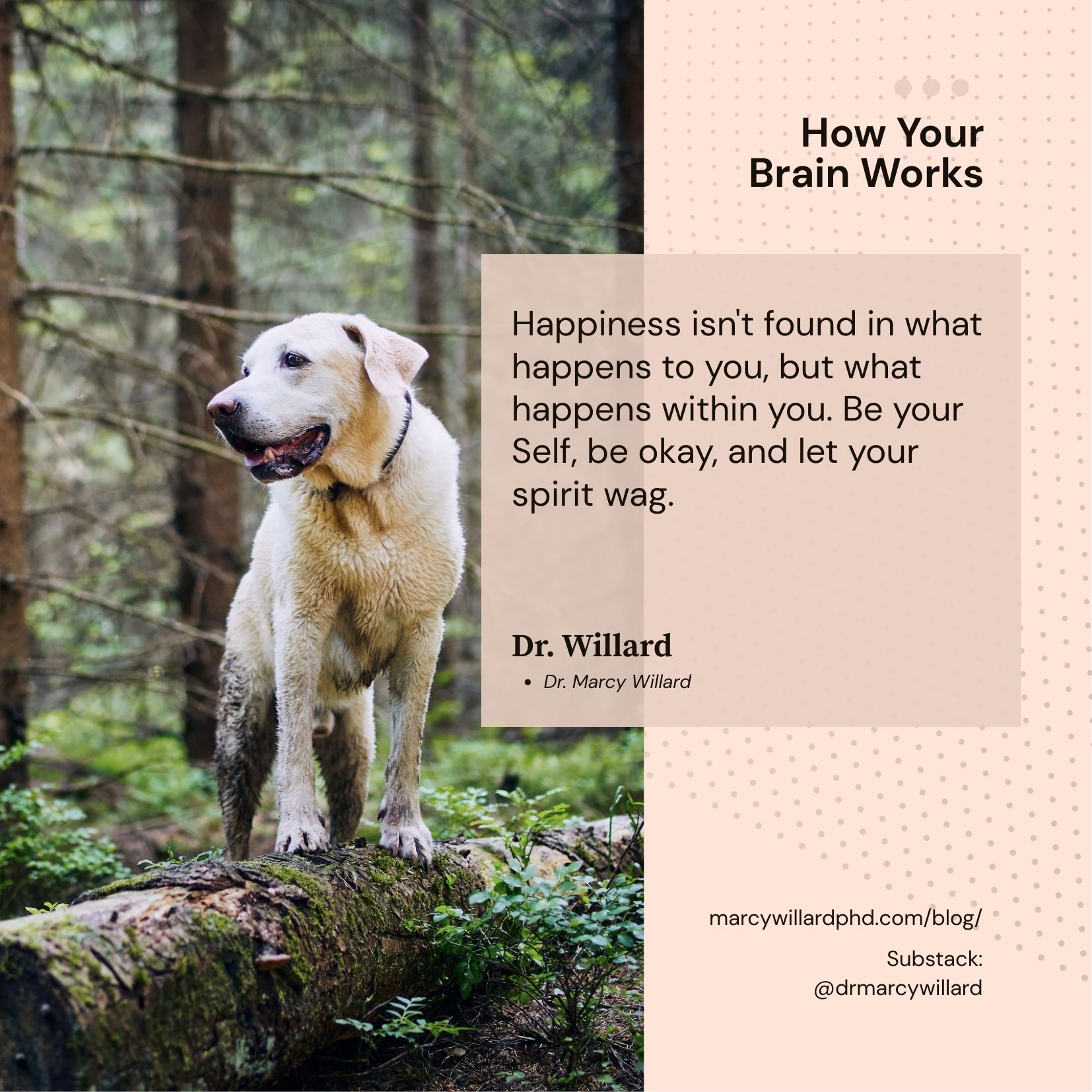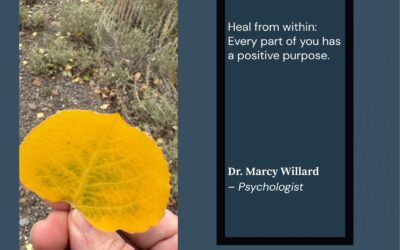How Your Brain Works: Episode 3
How Are You Really?
How are you? Let’s get real for a minute. When someone asks you “How are you?” what’s your automatic response? “Fine.” “Good.” “Not too bad.” Maybe the classic Midwestern “Fair to Midland” (and seriously, what does that even mean?!).
We all do it. It’s a social nicety, a verbal handshake. But how often do we actually stop to consider what that question truly means, or what our honest-to-goodness answer might be if we peeled back a few layers?
As a psychologist, I’ve spent years diving deep into the fascinating, sometimes wacky, world of the human mind. And I can tell you, understanding “how you are” is far more complex and far more empowering than a polite shrug. It’s about figuring out who the “You” is that we’re talking about in that question. Here’s some good news. There’s more to YOU than you might think!
The Inner Crew: Meet Your “Parts”
Ever feel like you’ve got a whole committee meeting going on inside your head? One part is super enthusiastic, another is dragging its feet, and a third is just worried about what everyone else thinks? Welcome to “Parts Work,” a concept that’s gaining a lot of traction in the psychology world, thanks in no small part to Richard Schwartz and his Internal Family Systems (IFS) therapy.
The core idea? We’re not just one monolithic entity. We’re made up of different “parts.” These are emotional states, belief systems, and coping mechanisms—all designed to help us navigate life. Now, here’s where it gets interesting: some of these parts, these well-intentioned parts, are primarily focused on protecting us. They’re like well-meaning but sometimes overzealous bodyguards, trying to shield us from any vulnerability or pain. Sounds good in theory, right?
But here’s the rub: if you’re constantly on high alert, trying to avoid any discomfort, you might actually be preventing yourself from truly healing.
Think about it: your mind is hardwired to seek pleasure and avoid pain.
And if life throws us a fair amount of pain (which, let’s be honest, it does), these protector parts can go into overdrive. We cling to past hurts, store up every negative experience, and fight tooth and nail to make sure that never happens again.
The Dog Poop Metaphor: A Stinky Lesson
Let me give you an analogy I love, mostly because it’s so ridiculously relatable (and a little gross). Imagine you’re out for a lovely stroll with your dog, enjoying the fresh air. Suddenly, you spot it: a rogue pile of doggie doo on the sidewalk, left by some inconsiderate human.
Now, you’ve got options:
- Go ballistic: Get super mad, ruin your entire day, launch into a tirade about the disrespect of some people. Maybe even tell everyone you know, or – even worse – post about it on social media. (We’ve all at least thought about this, let’s be honest.)
- Quietly resent it: You don’t make a scene, but you seethe internally. You carry that little nugget of irritation around with you, tainting your mood for hours.
- Let it go: Acknowledge it, roll your eyes, and keep walking. Life’s too short for sidewalk crap, literally. If you can truly let it go, maybe you kindly dispose of it on behalf of your inconsiderate neighbor.
But here’s the worst thing you could possibly do: take that dog poop home and put it in your living room. Then, every time you walk by, you get to smell it, be reminded of it, and feel that surge of disgust all over again.
Wait! Who would do such a thing?
Well, metaphorically speaking, we do this all the time. We take every slight, every criticism, every disappointment, and we mentally bring it home. We replay conversations, strategize revenge scenarios (even if they’re just in our heads), and build elaborate mental walls to prevent future harm.
Maybe a friend wronged you, and now you’ve got a killer speech ready just in case you run into them. Or you start driving a different route to work to avoid a coworker who rubbed you the wrong way. These perfectly ridiculous ideas are brought to you by your subconscious mind, working tirelessly to “protect” you.
The Problem: It Never Works
You just end up dragging that metaphorical dog poop through your life, missing out on opportunities and living in a state of constant mental vigilance.
The North Star
Here’s the good news, the really profound stuff that changes everything: within all these “parts” – the protectors, the wounded inner child, the angry teenager – there’s something else. Something unchanging, something whole, something fundamentally you.
We call it the Self with a capital S.
Psychologist Richard Swartz lectures frequently on this as a pioneer in ‘parts work’ with his Internal Family Systems (IFS) model. He reports that after clients have adequately identified all the parts, there is always something left. The person will say something like, “Oh, this!? This is not a part. This is just me here.” That’s the Self we are talking about here.
The Self isn’t your body, your thoughts, or your fleeting emotions. It’s the “You” that was there when you were five, when your body looked totally different. It’ll be there when you’re eighty. It’s your authentic core, the part of you that knows, deep down, that you’ve handled everything life has thrown at you so far, and you’ll handle whatever comes next.
Think of the Self as your ultimate internal compass, your “still small voice.” It’s that gut feeling, that flash of intuition, that knowing before you know. Ever closed your eyes and just felt like someone was staring at you? That’s the Self whispering. It’s not a disturbance; it’s pure insight, offering quiet guidance, like “I’m going to move to California” or “I’m going to marry that person.” These aren’t emotional impulses; they’re deep, resonant truths emerging from your core.
The Four Parts of Experience…And Why They Aren’t You
So, back to “How are you?” When someone asks, they’re not asking about the constant chatterbox in your mind, or the rollercoaster of your emotions. Because here’s a key distinction: you are not your thoughts or your feelings, although these are parts of your experiences in life. Modern psychology breaks down our experience into these four parts.
Four Parts
- Thoughts: The internal monologue, the ideas, the judgments, the plans.
- Emotions: The feelings – joy, sadness, anger, fear, excitement.
- Body Sensations: The physical feelings – tension, relaxation, warmth, coolness, butterflies.
- Images: The mental pictures, memories, or even imagined scenarios.
These are all incredibly important for understanding yourself and for healing “stuck” parts (which is the work of advanced therapeutic approaches like Transformational Psychology).
But here’s where it gets interesting: none of them are you. You are the one who notices these things. You are the observer of your thoughts and feelings, not the thoughts and feelings themselves. That observer? That’s the Self.
When your Self is dealing well with these four parts of your experience, you feel great. Modern approaches such as Transformational Psychology and Transpersonal Psychology identify these as ‘Aspects’ of the self. Your miserable feelings, bad moods, and stuck emotions are all aspects of you that are here for a reason. They are here to send you a message and to help you handle the situation in front of you. Once they are addressed properly, these ‘Aspects’ are not a problem.
They’re not overwhelming you, and you’re letting them flow rather than clinging to them. Then the real YOU is truly fantastic! That’s when your answer to “How are you?” can genuinely be “I’m amazing!” or “Totally content!”
Everything will be okay when you’re okay with everything
Here’s a truth bomb I love, from the brilliant Michael Singer: “Everything will be okay when you are okay with everything.”
Read that again. It’s not saying that everything out there needs to be perfect for you to be okay. It’s saying that your internal state of “okay-ness” is the only true determinant of your well-being. It’s not about external circumstances; it’s about how your Self navigates and processes them.
Think about it: that mad energy, that resentment, that feeling of being overwhelmed and exhausted – all of that comes from your reaction to events, people, and situations outside of you. Your “being okay” has absolutely nothing to do with whether the traffic was bad, or your boss was grumpy, or the dog left a mess on the sidewalk. You are not what is happening in the outside world.
You are the one watching all of this
And here’s the best part: You are the only one in there! You have total, unadulterated access to your Self.
Be more like a dog (seriously)
This concept can feel pretty foreign because we’re so conditioned to let external events dictate our internal state. So, let’s go back to our furry, four-legged friends.
Think about your dog or any dog you know. Most of the time, they’re pretty darn content, aren’t they? Wagging their tails, happy to see you, ready for an adventure. Now, what happens if something “bad” happens? Maybe the mailman comes, or there’s a loud noise, or another dog barks at them. Sure, there’s a disturbance. The dog might bark, whine, or look momentarily upset.
But as soon as that disturbance passes, what happens? They’re back to wagging, back to sniffing, back to pure doggy contentment. It’s like nothing ever happened. And in the grand scheme of things, for them, nothing did. The disturbance happened, it passed, and they returned to their natural state of being okay.
That’s the secret, my friends. We, as humans, tend to take that disturbance, that metaphorical dog poop, and carry it with us. We think on it, ruminate on it, let it define our entire day, week, or even years. But what if we could be more like the dog? What if we could experience the disturbance, let it pass, and return to our innate state of contentment?
Happiness isn’t something you find out there. It’s not in the perfect job, the ideal relationship, the fancy car, or the number of likes on your latest social media post. Those are all external, fleeting, and ultimately incapable of providing lasting peace.
True happiness, true contentment, comes from the Self. It comes from spending more time in that space of the observer, the part of you that can witness the thoughts, emotions, body sensations, and images without getting completely swept away by them. It’s about recognizing that these four aspects of your experience are just visitors, passing through, and they don’t define who you truly are.
When you can do that – when you can be okay with the traffic, okay with the grumpy boss, okay with the dog poop on the sidewalk (or, you know, the metaphorical version) – then you are truly, deeply, and powerfully okay. You’ve stopped dragging the mess through your life and have returned to your natural state of wellbeing.
Unconditional Wellbeing
In essence, the perennial question, “How are you?” transforms from a casual greeting into a profound inquiry about the state of our deepest being. By embracing the concept of the “Self”—that unwavering, intuitive core within each of us—and learning to acknowledge but not dwell on the fleeting disturbances of thoughts, emotions, body sensations, and images, we unlock the door to genuine contentment.
Just as a dog quickly returns to its innate cheerfulness after a momentary upset, we too can cultivate a profound internal resilience. This shift in perspective allows us to answer “How are you?” not with a mere platitude, but with an authentic declaration of peace and wellbeing, rooted in the understanding that true happiness flourishes when we are okay with everything, and everything is okay within ourselves.
References On Parts Work and Transformational Psychology:
Swartz, Richard (May 14, 2025). Internal Family Systems. 36th Annual Trauma Conference. Boston, MA
Swartz, Richard (November 13, 2023). Legacy Burdens. Global Exchange Conference. Orlando, FL.
Wesly Feuquay (October 22, 2024). 20 Minute Transformations: A Coach’s Toolkit for Rapid, Reliable, and Revolutionary Change. Amazon




